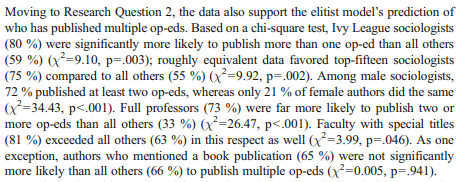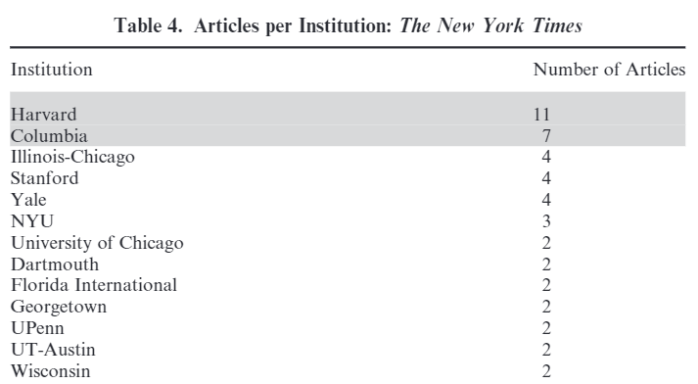the media will not save public sociology
A few days ago, I totally and accidentally started a tweet storm by suggesting that the lack of institutionalized mechanisms for translating sociology into policy or public impact reflected the possibility that public impact was a secondary goal of sociologists. During the discussion, a few people noted that mass media appearances are important. For example, my colleague and hallway neighbor Jess Calarco noted that media impact can be important.
My response: Definitely true, but let’s not over state the national media as a process by which sociology’s impact will be cultivated and maintained. Why? A lot of research on op-eds by academics shows that the mass media is very selective in terms of which academics it will pick up. Mass media coverage is rare and goes mainly to elites in the field.
Example #1: In the American Sociologist, Joshua Woods examines data on ALL sociologists published in the NY Times over a 32 year period. The major findings?
The study also shows that the length and number of op-eds published by sociologists depend on the authors’ sex, professional rank, university affiliation and other elements of social status. Finally, supporting Merton’s Matthew effect, the findings reveal in part how the gap between the upper and lower levels of the academic hierarchy – as it pertains to op-ed publication – has widened in the last decades.
When you dig into the article, the picture becomes pretty stark. Woods tests the hypothesis that national media favors elite sociologists by comparing the rate of op ed publication by Ivy League authors and top-fifteen department authors vs. everyone else:

The evidence is pretty clear, national media attention for sociologists is way, way more likely to go to disciplinary elites.
Example #2: Bob Summer and John Maycroft in Politics & Policy analyze all academics who get op eds in a range of news papers in the year 2006. They also explore how getting an op ed leads to policy impact. The finding is (almost) the same. First, from the abstract:
We argue that timeliness, agreement with the editorial page, readability, and an understanding of the target newspaper are essential to op-ed publication and an expansion of academics’ influence over public policy.
The potential for influence need not stop there, however. An op-ed serves as a “calling card” for its author, assisting with access to executive branch officials, lawmakers, and their staff. If lawmakers do not contact an author of their own initiative, a well-circulated op-ed serves as a fine introduction for an author trying to expand his or her influence through personal contact with politicians.

And for a conservative tilt:

The New York Times loves very elite schools. Every school to land more than one op-ed is R1, with one exception. And the Ivy League is very well represented. The Wall Street Journal is also R1 and elite intensive, but not Ivy League oriented, except for Harvard. I omitted Table 2 in this discussion because Summer and Maycroft include a local New Jersey paper, the Star Ledgers, which publishes tons of Rutgers-Camden faculty.
To repeat, I am not against media attention for sociology. And I have participated in the op ed process. It happened as Jess suggests: I got a major newspaper op ed and it opened doors. At the same time, I recognize that it’s the academic equivalent of winning the lottery and it’s a lottery favors people like me – older and who work at higher tier institutions.
This is why I am very interested in institutions like NBER, Soc ArXiv, and Contexts. And blogs, yes, blogs. These are mechanisms for building up a knowledge base that sociologists control. Anyone can submit to Soc ArXiv and anyone can publish in Contexts (not just elites). That is the foundation of a broad and sustainable public sociology.
++++++++
BUY THESE BOOKS!!
50+ chapters of grad skool advice goodness: Grad Skool Rulz ($4.44 – cheap!!!!)
A theory book you can understand!!! Theory for the Working Sociologist (discount code: ROJAS – 30% off!!)
The rise of Black Studies: From Black Power to Black Studies
Did Obama tank the antiwar movement? Party in the Street
Read Contexts Magazine– It’s Awesome!!!!
You need to take whatever policy suggestions, based on your academic research, straight to LinkedIn.
Bypass the “elite” newspapers — because they too are looking for an audience in LinkedIn.
LikeLike
michael webster
April 15, 2019 at 12:36 am
Nobody said “by pass,” but media coverage is highly selective, goes to people who already have great resources, and is often out of the control of sociologists. Great if you can get it, but don’t depend on it!
LikeLike
fabiorojas
April 15, 2019 at 12:39 am
You are missing my point, I think.
Both the New York Times and WSJ have company pages on LinkedIn?
Why? Because they believe an audience for their articles exists on LinkedIn.
So, if you want the NYT and WSJ audience, why not publish directly on LinkedIn?
LikeLike
michael webster
April 15, 2019 at 12:44 am
Ah… I see! My bad – I was missing your point. That is not a bad idea. A lot of academics have built networks for media contacts, but I don’t think many have thought of embedding it into something like LinkdIn.
If you have tips or idea on how to best do this, or what is involved, feel free to email me at my university email (frojas AT Indiana …. edu).
LikeLike
fabiorojas
April 15, 2019 at 12:48 am
I will be happy to do that.
LikeLike
michael webster
April 15, 2019 at 1:03 am
Just for the record, UIC isn’t usually categorized as one of the elite departments. We do support public sociology…and try harder. Don’t need elite status for op-eds. Barbara Risman
Sent from my iPhone
>
LikeLiked by 2 people
bjrisman
April 15, 2019 at 2:15 am
I think one of the things you are missing is that a lot of policy impact is not about elites at all. Indeed, one of the major shortcomings of the Democratic Party over the past generation has been its focus on elite, national-level politics, leading it to ignore, and cede power to Republicans in, local contexts. Not to at all understate the impact of national politics, of course, but so many of the kinds of policy that sociologists study, write about, and may seek to influence occur at the local or state level, in areas like education, policing, corrections, family law, housing and land use, etc. In some states, such policy conversations may be driven by the NYT, but in others, and in most localities, national newsmedia (and national blogs) are irrelevant. Here in my state, you have more of an impact on policy by writing an op-ed in our local paper, contributing to local political blogs, being featured on local TV news, and getting to know local policymakers. The elite-focused metrics you seem most interested in have no way to capture all of that.
LikeLiked by 2 people
Mikaila
April 15, 2019 at 4:06 am
Note Jess’s tweet you cite was about “mainstream media coverage,” not op-eds. News reporting about research, and commenting on the news in news articles, is different.
LikeLike
Philip N. Cohen
April 15, 2019 at 11:15 am
There were numerous other twitter threads that included detailed and thoughtful responses to your original post that went far beyond op-eds in the mainstream press.
LikeLike
Joel Stillerman
April 15, 2019 at 12:19 pm
In 2013 I looked at this in the New York Times, and found 124 sociologists mentioned. I don’t know if anyone has done that more systematically since https://familyinequality.wordpress.com/2014/02/20/quote-that-sociologist-124-in-the-times-edition/
LikeLike
Philip N. Cohen
April 15, 2019 at 12:34 pm
@Phil: My colleagues Tim Hallett and Orla Stapleton, with Iowa’s super Michael Sauder, have a forthcoming paper on how social science ideas hit and stick and media in a Journal Near You (not Contexts!). It has multiple arguments, but one big idea is that a lot of citation and discussion of social science ideas is driven by “retrieval” – journalists picking up sociology to fit a narrative. That is important to know as it suggests that the media ( and not just op eds) is really pushing narratives and not really using social science to reshape the public’s view of what is good/bad policy. You also get a little of this from Summer and Maycroft’s article, where “fit” is a big issue, whether the social science fits the editorial page slant.
LikeLike
fabiorojas
April 15, 2019 at 3:00 pm